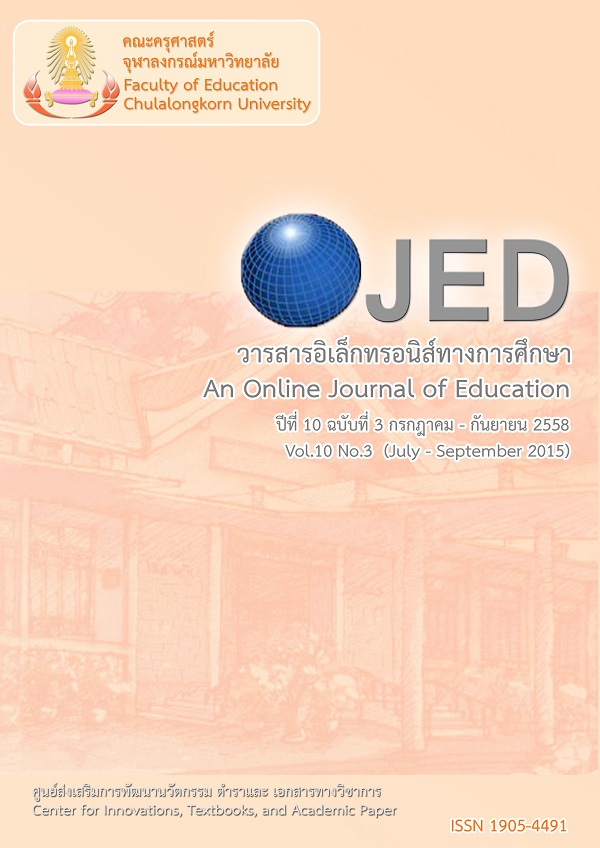ผลของการจัดกิจกรรมเสริมประสบการณ์ตามแนววิทยาศาสตร์ เทคโนโลยี สังคม สิ่งแวดล้อมที่มีต่อพฤติกรรมการอนุรักษ์สิ่งแวดล้อมของเด็กวัยอนุบาล
Keywords:
การสอนแนววิทยาศาสตร์ เทคโนโลยี สังคม สิ่งแวดล้อม, พฤติกรรมการอนุรักษ์สิ่งแวดล้อม, เด็กวัยอนุบาล, SCIENCE-TECHNOLOGY-SOCIETY-ENVIRONMENT APPROACH, ENVIRONMENTAL CONSERVATION BEHAVIORS, PRESCHOOL CHILDRENAbstract
การวิจัยครั้งนี้มีวัตถุประสงค์เพื่อ 1) ศึกษาพฤติกรรมการอนุรักษ์สิ่งแวดล้อมของเด็กวัยอนุบาลใน 2 ด้าน ได้แก่ ด้านการใช้ และด้านการดูแลรักษา หลังการจัดกิจกรรมเสริมประสบการณ์ตามแนววิทยาศาสตร์ เทคโนโลยี สังคม สิ่งแวดล้อม 2) เปรียบเทียบพฤติกรรมการอนุรักษ์สิ่งแวดล้อมด้านการใช้ของเด็กวัยอนุบาล ก่อนและหลังการจัดกิจกรรมเสริมประสบการณ์ตามแนววิทยาศาสตร์ เทคโนโลยี สังคม สิ่งแวดล้อม และ 3) เปรียบเทียบพฤติกรรมการอนุรักษ์สิ่งแวดล้อมด้านการดูแลรักษาของเด็กวัยอนุบาล ก่อนและหลังการจัดกิจกรรมเสริมประสบการณ์ตามแนววิทยาศาสตร์ เทคโนโลยี สังคม สิ่งแวดล้อม ตัวอย่างประชากรคือ เด็กชั้นอนุบาลปีที่ 2 ที่กำลังศึกษาอยู่ในโรงเรียนอนุบาลเชียงใหม่ สังกัดสำนักงานเขตพื้นที่การศึกษาประถมศึกษาเชียงใหม่ เขต 1 จำนวน 20 คน โดยใช้แผนการจัดกิจกรรมเสริมประสบการณ์ตามแนววิทยาศาสตร์ เทคโนโลยี สังคม สิ่งแวดล้อม และใช้ระยะเวลาในการดำเนินการทดลอง 14 สัปดาห์ เครื่องมือที่ใช้ในการวิจัย คือ แบบสังเกตพฤติกรรมการอนุรักษ์สิ่งแวดล้อมของเด็กวัยอนุบาล วิเคราะห์ข้อมูลโดยหาค่าเฉลี่ย ส่วนเบี่ยงเบนมาตรฐาน การทดสอบค่าที และค่าร้อยละ ด้วยโปรแกรมคอมพิวเตอร์สำเร็จรูป
ผลการวิจัยพบว่า 1) หลังการจัดกิจกรรมเสริมประสบการณ์ตามแนววิทยาศาสตร์ เทคโนโลยี สังคม สิ่งแวดล้อม เด็กวัยอนุบาลมีค่าเฉลี่ยคะแนนพฤติกรรมการอนุรักษ์สิ่งแวดล้อมด้านการใช้เท่ากับร้อยละ 85.42 และด้านการดูแลรักษาเท่ากับร้อยละ 94.38 ซึ่งสูงกว่าเกณฑ์ที่กำหนดคือ ร้อยละ 80 และจัดอยู่ในเกณฑ์พฤติกรรมการอนุรักษ์สิ่งแวดล้อมในระดับดีมาก 2) หลังการจัดกิจกรรมเสริมประสบการณ์ตามแนววิทยาศาสตร์ เทคโนโลยี สังคม สิ่งแวดล้อม เด็กวัยอนุบาลมีค่าเฉลี่ยคะแนนพฤติกรรมการอนุรักษ์สิ่งแวดล้อมด้านการใช้ สูงกว่าก่อนการจัดกิจกรรมอย่างมีนัยสำคัญทางสถิติที่ระดับ .01 และ 3) หลังการจัดกิจกรรมเสริมประสบการณ์ตามแนววิทยาศาสตร์ เทคโนโลยี สังคม สิ่งแวดล้อม เด็กวัยอนุบาลมีค่าเฉลี่ยคะแนนพฤติกรรมการอนุรักษ์สิ่งแวดล้อมด้านการดูแลรักษา สูงกว่าก่อนการจัดกิจกรรมอย่างมีนัยสำคัญทางสถิติที่ระดับ .01
The purposes of the research were 1) to study the environmental conservation behaviors of preschool children in 2 aspects: using and maintenance after the experiential activities based on science-technology-society-environment approach 2) to compare the environmental conservation behaviors in the aspects of using of preschool children before and after the experiential activities based on science-technology-society-environment approach and 3) to compare the environmental conservation behaviors in the aspects of maintenance of preschool children before and after the experiential activities based on science-technology-society-environment approach. The sample was twenty children at the second level of kindergarten at Anubaan Chiang Mai School in the Chiang Mai Primary Educational Service Area Office 1. The sample used the activities based on science-technology-society-environment approach for 14 weeks. The instruction used the activities based on science-technology-society-environment approach. The research duration was 14 weeks. The research instruments was the observation form for kindergarten. The data was statistically analyzed by using arithmetic mean, standard deviation, t-test and mean of percentage.
The research finding were as follows: 1) After the experiential activities based on science-technology-society-environment approach, the mean of percentage score of preschool children’s environmental on conservation behaviors in the aspect of using was 85.42 percent while the aspect of maintenance was 94.38 percent which was higher than the criterion score set at 80 percent, and was rated as very good. 2) After the experiential activities based on science-technology-society-environment approach, the mean of percentage score of preschool children’s environmental conservation behaviors in the aspects of using was higher than those of before at .01 level of significance. And 3) After the experiential activities based on science-technology-society-environment approach, the mean of percentage score of preschool children’s environmental conservation behaviors in the aspects of maintenance was higher than those of before at .01 level of significance.




